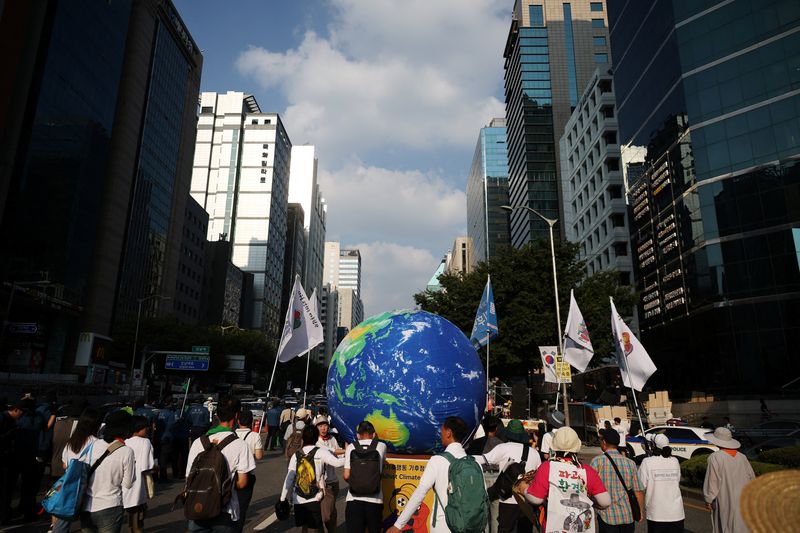By Sebin Choi and Daewoung Kim
SEOUL (Reuters) – More than 30,000 protesters gathered in South Korea’s capital in sweltering heat on Saturday, demanding more aggressive government action to combat global warming.
With temperatures above 30 degrees Celsius (86 degrees Fahrenheit), protesters young and old marched in the country’s largest demonstration so far this year, disrupting traffic in central Seoul.
They waved large banners reading “Climate Justice,” “Protect Our Lives!” and “NO to the government of climate villain (President) Yoon Suk Yeol”.
“The truth is that without the air conditioning, this summer was not livable and people would not be able to live like human beings,” said Yu Si-yun, an environmental activist who led the protests.
“We are facing a problem that is not unique to any country or individual. We need systemic change and we are running out of time to take action.”
The protest, organized by the 907 Climate Justice March Group Committee, followed a ruling last month by South Korea’s Supreme Court that the country’s climate change law fails to protect basic human rights and has no goals to protect future generations.
The two hundred plaintiffs, including young climate activists and even some children, told the constitutional court that the government is violating the human rights of citizens by not doing enough about climate change.
South Korea, which aims to be carbon neutral by 2050, is the second-biggest coal polluter among the Group of 20 major economies after Australia, with slow adoption of renewable energy. The government last year cut its 2030 targets for reducing industrial greenhouse gas emissions, but maintained its national target of cutting emissions by 40% from 2018 levels.
Even South Korean kimchi has fallen victim to climate change. Farmers and manufacturers say the quality and quantity of the Chinese cabbage used in the ubiquitous pickled dish is suffering as the heat increases.
“Feel how long this summer lasts,” said Kim Ki-chang, a 46-year-old novelist who took part in the protest for the third year in a row.
“This would be a much bigger threat and survival problem for the younger generations than for the older generations, so I think the older generation needs to do something more actively for the next generation.”

Seoul has had a record 20 consecutive nights defined as “tropical”, with low temperatures above 25 C (77 F).
Kim Eun-jung, a member of the protest organizing committee, said that this year’s protesters chose the popular financial and shopping area of Gangnam, rather than the Gwanghwamun area they used last year, to make their voices heard by the many big companies there that group blames for CO2 emissions.


